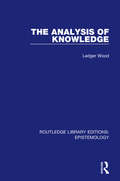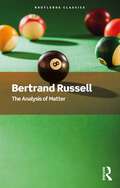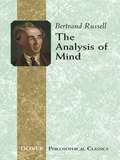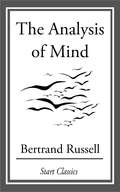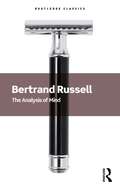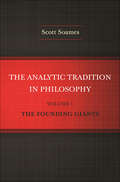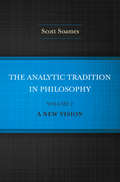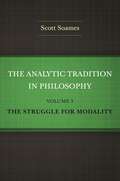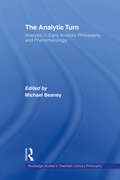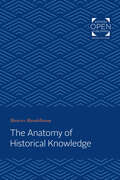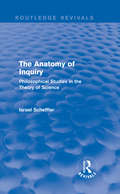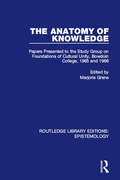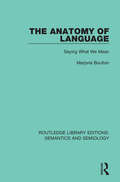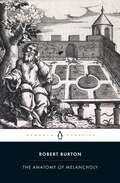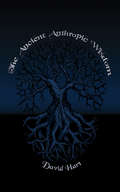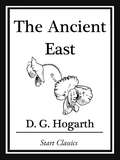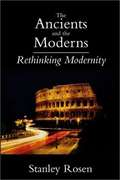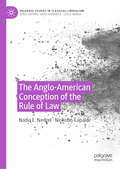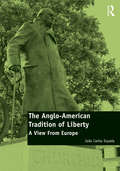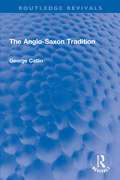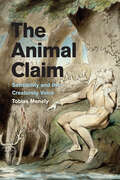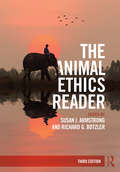- Table View
- List View
The Analysis of Knowledge (Routledge Library Editions: Epistemology)
by Ledger WoodOriginally published in 1940. Firstly, this book seeks to combine epistemology and the new developments of the time in psychology. It holds that no epistemology can be sound if it is psychologically defective, nor can a psychological analysis of knowledge be philosophically naïve. Secondly, it attempts to suggest a single structural pattern underlying every type of cognitive situation. Offering a significant reorientation to epistemological thought of its time, this work considers perception, sense and memory and examines the referential theory of knowledge. It is a lucid and precisely organised reading and analysis of knowledge.
The Analysis of Matter (Routledge Classics)
by Bertrand RussellThe Analysis of Matter is the product of thirty years of thinking by one of the twentieth century's best-known philosophers. An inquiry into the philosophical foundations of physics, it was written against the background of stunning new developments in physics earlier in the century, above all relativity, as well as the excitement around quantum theory, which was just being developed. Concerned to place physics on a stable footing at a time of great theoretical change, Russell argues that the concept of matter itself can be replaced by a logical construction whose basic foundations are events. He is careful to point out that this does not prove that matter does not exist, but it does show that physicists can get on with their work without assuming that matter does exist. Russell argues that fundamental bits of ''matter'', such as electrons and protons, are simply groups of events connected in a certain way and their properties are all that are required for physics. This Routledge Classics edition includes the 1992 Introduction by John G. Slater.
The Analysis of Mind
by Bertrand Russell"A most brilliant essay in psychology."--New Statesman"A delightful experience."--Joseph ConradPhilosopher, mathematician and social critic, Bertrand Russell was awarded the Nobel Prize for Literature in 1950. In The Analysis of Mind, one of his most influential and exciting books, Russell presents an intriguing reconciliation of the materialism of psychology with the antimaterialism of physics.This book established a new conception of the mind and provided one of the most original and interesting externalist accounts of knowledge. Drawing upon the writings of psychologists such as William James and John Watson, Russell offers a comprehensive treatment of such considerations as belief, desire, habit, memory, meaning, and causal law. His reasoning formed the foundation for many subsequent theories of mind, as well as a framework for his own later philosophical writings. It remains one of the most important works on the philosophy of the mind.
The Analysis of Mind
by Bertrand RussellAn unabridged edition with updated footnotes and layout, to include: Recent Criticisms of "Consciousness" - Instinct and Habit - Desire and Feeling - Influence of Past History on Present Occurrences in Living Organisms - Psychological and Physical Causal Laws - Introspection - The Definition of Perception - Sensations and Images - Memory - Words and Meaning - General Ideas and Thought - Belief - Truth and Falsehood - Emotions and Will - Characteristics of Mental Phenomena
The Analysis of Mind (Routledge Classics)
by Bertrand RussellBertrand Russell wrote The Analysis of Mind during one of the most turbulent periods of his life. He began it in 1918 whilst in in prison in London for his opposition to the First World War, and completed it in Peking (now Beijing) in 1921, where he had been giving lectures at the National University. It is a vital book for understanding Russell's philosophy. He argues for a fresh conception of the mind, provided by his eclectic fusion of William James’s 'neutral monism'; the emerging theory of behaviourism, to which Russell was strongly drawn; and his own new causal theory of meaning. As such, The Analysis of Mind built a foundation for the distinctive brand of much of his later philosophical writing. In his customary sharp prose, Russell explores fundamental questions about the mind, including desire and feeling; the vexed relationship between psychological and physical laws; sensations and mental images; memory; belief; and emotions and the will. This Routledge Classics edition includes an Introduction by Thomas Baldwin.
The Analytic Tradition in Philosophy, Volume 1: The Founding Giants (The Analytic Tradition in Philosophy)
by Scott SoamesThis is the first of five volumes of a definitive history of analytic philosophy from the invention of modern logic in 1879 to the end of the twentieth century. Scott Soames, a leading philosopher of language and historian of analytic philosophy, provides the fullest and most detailed account of the analytic tradition yet published, one that is unmatched in its chronological range, topics covered, and depth of treatment. Focusing on the major milestones and distinguishing them from the dead ends, Soames gives a seminal account of where the analytic tradition has been and where it appears to be heading.Volume 1 examines the initial phase of the analytic tradition through the major contributions of three of its four founding giants—Gottlob Frege, Bertrand Russell, and G. E. Moore. Soames describes and analyzes their work in logic, the philosophy of mathematics, epistemology, metaphysics, ethics, and the philosophy of language. He explains how by about 1920 their efforts had made logic, language, and mathematics central to philosophy in an unprecedented way. But although logic, language, and mathematics were now seen as powerful tools to attain traditional ends, they did not yet define philosophy. As volume 1 comes to a close, that was all about to change with the advent of the fourth founding giant, Ludwig Wittgenstein, and the 1922 English publication of his Tractatus, which ushered in a "linguistic turn" in philosophy that was to last for decades.
The Analytic Tradition in Philosophy, Volume 2: A New Vision
by Scott SoamesAn in-depth history of the linguistic turn in analytic philosophy, from a leading philosopher of languageThis is the second of five volumes of a definitive history of analytic philosophy from the invention of modern logic in 1879 to the end of the twentieth century. Scott Soames, a leading philosopher of language and historian of analytic philosophy, provides the fullest and most detailed account of the analytic tradition yet published, one that is unmatched in its chronological range, topics covered, and depth of treatment. Focusing on the major milestones and distinguishing them from detours, Soames gives a seminal account of where the analytic tradition has been and where it appears to be heading.Volume 2 provides an intensive account of the new vision in analytical philosophy initiated by Ludwig Wittgenstein’s Tractatus Logico-Philosophicus, its assimilation by the Vienna Circle of Moritz Schlick and Rudolf Carnap, and the subsequent flowering of logical empiricism. With this “linguistic turn,” philosophical analysis became philosophy itself, and the discipline’s stated aim was transformed from advancing philosophical theories to formalizing, systematizing, and unifying science. In addition to exploring the successes and failures of philosophers who pursued this vision, the book describes how the philosophically minded logicians Kurt Gödel, Alfred Tarski, Alonzo Church, and Alan Turing discovered the scope and limits of logic and developed the mathematical theory of computation that ushered in the digital era. The book’s account of this pivotal period closes with a searching examination of the struggle to preserve ethical normativity in a scientific age.
The Analytic Tradition in Philosophy, Volume 3: The Struggle for Modality
by Scott SoamesAn in-depth history of modal logic in analytic philosophy, from a leading philosopher of languageThis is the third of five volumes of a definitive history of analytic philosophy from the invention of modern logic in 1879 to the end of the twentieth century. Scott Soames, a leading philosopher of language and historian of analytic philosophy, provides the fullest and most detailed account of the analytic tradition yet published, one that is unmatched in its chronological range, topics covered, and depth of treatment. Focusing on the major milestones and distinguishing them from detours, Soames gives a seminal account of where the analytic tradition has been and where it appears to be heading.Volume 3 explains the most important achievement in the analytic tradition in the twentieth century—the rise and development of the epistemic and metaphysical modalities of necessity, possibility, and conceivability—and how it opened new vistas for the understanding of mind, meaning, and metaphysics. At the center of the story is Saul Kripke, who generated new modal systems and their open-ended philosophical applications, and his undergraduate teacher, W.V.O. Quine, who rejected the modalities plus our notions of linguistic meaning and reference. Part 1 traces the rise of modal logic from C. I. Lewis&’s unhappiness with Alfred North Whitehead and Bertrand Russell&’s Principia Mathematica, through Lewis&’s modal S-systems, Ruth Marcus&’s proof-theoretic quantified modal logic, Rudolph Carnap&’s Meaning and Necessity, and Kripke&’s logical and philosophical breakthrough. Part 2 chronicles Quine&’s rejection of meaning, necessity, synonymy, and reference. Part 3 assesses the philosophical framework provided by Kripke&’s Naming and Necessity, separating its revolutionary insights from its unsolved problems.
The Analytic Turn: Analysis in Early Analytic Philosophy and Phenomenology (Routledge Studies in Twentieth-Century Philosophy)
by Michael BeaneyThis collection, with contributions from leading philosophers, places analytic philosophy in a broader context comparing it with the methodology of its most important rival tradition in twentieth-century philosophy--phenomenology, whose development parallels the development of analytic philosophy in many ways. The Analytic Turn will be of great interest to historians of philosophy generally, analytic philosophers, and phenomenologists.
The Anatomy of Historical Knowledge
by Maurice MandelbaumOriginally published in 1977. In this major work, an overview of the structure of historical writing, Maurice Mandelbaum clarifies some of the problems concerning the nature of history as a discipline, of what constitutes explanation in history, and whether historical knowledge is as reliable as other forms of knowledge. The work is divided into three parts. The first part provides an analytic account of different types of historical inquiry. The second treats at length the nature of causal explanation in everyday life and in science and considers the relation between causes and laws. The final part analyzes the concept of objectivity and estimates both the extent to which the inquiries of historians can be said to be objective and the limits of that objectivity in some types of historical accounts.
The Anatomy of Inquiry: Philosophical Studies in the Theory of Science (Routledge Revivals)
by Israel SchefflerFirst published in 1963, this title considers the philosophical problems encountered when attempting to provide a clear and general explanation of scientific principles, and the basic confrontation between such principles and experience. Beginning with a detailed introduction that considers various approaches to the philosophy and theory of science, Israel Scheffler then divides his study into three key sections – Explanation, Significance and Confirmation – that explore how these complex issues involved have been dealt with in contemporary research. This title, by one of America’s leading philosophers, will provide a valuable analysis of the theory and problems surrounding the Philosophy of Science.
The Anatomy of Knowledge: Papers Presented to the Study Group on Foundations of Cultural Unity, Bowdoin College, 1965 and 1966 (Routledge Library Editions: Epistemology)
by Marjorie GreneOriginally published in 1969. Since the seventeenth century the kind of knowledge afforded by mathematical physics has come more and more to furnish mankind with an ideal for all knowledge. The ideal also carries with it a new conception of the nature of things: all things whatsoever are held to be intelligible ultimately in terms of the laws of inanimate nature. This reductionist formula can be overcome only by the fundamental rethinking of our philosophical premises. To contribute towards thsi rethinking was the aim of the Study Group at whose meetings this collection originated. The essayists come from a wide range of disciplines but all want to address the conflict in our culture. The first part consists of discussions of various fundamental problems in the sciences. There are essays on the inter-relation of physics and psychology, on the possible reduction of biology to physics and chemistry, on new approaches to experimental psychology, against the possibility of giving a purely ‘factual’ account of social and political life, and for a fundamental reform of our concept of responsibility. The second section of the book suggests lines of philosophical inquiry which might help to resolve the epistemological and ethical problems arising at the foundations of physics, biology, psychology and the social sciences.
The Anatomy of Language: Saying What We Mean (Routledge Library Editions: Semantics and Semiology #2)
by Marjorie BoultonFirst published in 1959, this book aims to provide a practical introduction to semantics, relating the critical study of language to real-life situation, with a wealth of anecdotes and numerous illustrations drawn from everyday personal predicaments. This book provides much information and much material for profitable discussion, helping to make accessible what can be a highly academic subject comprehensible only to a minority. This book provides a highly valuable foundation for students of linguistics and will provide preparation for further study.
The Anatomy of Melancholy
by Robert Burton'The best book ever written' Nicholas Lezard, GuardianRobert Burton's labyrinthine, beguiling, playful masterpiece is his attempt to 'anatomize and cut up' every aspect of the condition of melancholy, from which he had suffered throughout his life. Ranging over beauty, digestion, the planets, alcohol, goblins, kissing, poetry and the restorative power of books, among many other things, The Anatomy of Melancholy has fascinated figures from Samuel Johnson to Jorge Luis Borges since the seventeenth century, and remains an incomparable examination of the human condition in all its flawed, endless variety.Edited with an introduction by Angus Gowland
The Ancient Anthropic Wisdom
by David HartPart religious, part scientific study, The Ancient Anthropic Wisdom follows on from the Age of Aquarius - the Golden Age of Mankind, giving an insight into 'man' and his world as he never knew. Meditation tips, the hidden meaning of the Tree of Life, Solomon's Keys, Twin Souls and celestial guidance make for a truly fascinating read for everyone seeking answers to the mysteries of 'life' and 'man'.
The Ancient East
by D. G. HogarthPublished in 1914, The Ancient East was written by British archaeologist David George Hogarth
The Ancient Quarrel between Philosophy and Poetry
by Raymond BarfieldFrom its beginnings, philosophy's language, concepts, and imaginative growth have been heavily influenced by poetry and poets. Drawing on the work of a wide range of thinkers throughout the history of western philosophy, Raymond Barfield explores the pervasiveness of poetry's impact on philosophy and, conversely, how philosophy has sometimes resisted or denied poetry's influence. Although some thinkers, like Giambatista Vico and Nietzsche, praised the wisdom of poets, and saw poetry and philosophy as mutually beneficial pursuits, others resented, diminished or eliminated the importance of poetry in philosophy. Beginning with the famous the passage in Plato's Republic in which Socrates exiles the poets from the city, this book traces the history of the ancient quarrel between philosophy and poetry through the works of thinkers in the Western tradition ranging from Plato to the work of the contemporary thinker Mikhail Bakhtin.
The Ancients and the Moderns: Rethinking Modernity
by Stanley RosenIn this insightful and controversial book, the eminent philosopher Stanley Rosen takes a new look at the famous 'quarrel' that the moderns have with the ancients, analyzing and comparing ancient philosophers and modern Continental and analytical thinkers from Plato, Descartes, and Kant to Fichte, Nietzsche, and Rorty. He urges that we do not dismiss the classical heritage but appropriate it, for this appropriation is an indispensable step in the process of legitimizing our historical experience.
The Anglo-American Conception of the Rule of Law (Palgrave Studies in Classical Liberalism)
by Nicholas Capaldi Nadia E. NedzelThis book offers a multidisciplinary account of the 'rule of law' as a central pillar of the classical liberal tradition. The authors analyze the original meaning of this expression as first introduced by British jurist A. V. Dicey, before examining its subsequent elaboration by Leoni, Fuller, Hayek and Oakeshott. Addressing the main philosophical and legal aspects of the rule of law, this volume will appeal to all those engaged in law, political theory, philosophy, economics, business ethics, and public policy.
The Anglo-American Tradition of Liberty: A view from Europe
by João Carlos EspadaJoao Carlos Espada's provocative survey of a group of key Anglo-American and European political thinkers argues that there is a distinctive, Anglo-American tradition of liberty that is one of the core pillars of the Free World. Giving a broad overview of the tradition through summaries of the careers and ideas of fourteen of its key thinkers, neglected despite having been tremendously influential in the tradition of liberty, the author engages with current set ideas about the meaning of 'liberal' and 'conservative' to offer an engaging, intellectual case for liberal democracy.
The Anglo-Kuki War, 1917–1919: A Frontier Uprising against Imperialism during the First World War
by Jangkhomang Guite Thongkholal HaokipThis book explores the Kuki uprising against the British Empire during the First World War in Northeast frontier of India (then Assam-Burma frontier). It underlines how of the three-year war (1917–1919), spanning over 6,000 square miles, is crucial to understanding present-day Northeast India. The essays in the volume examine several aspects of the war, which had far-reaching consequences for the indigenous population as well as for British attitudes and policy towards the region – including military strategy and tactics, violence, politics, identity, institutions, gender, culture, and the frontier dimensions of the First World War itself. The volume also looks at how the conflict affected the larger dynamics of the region within Asia, and its relevance in world politics beyond the Great War. Drawing on archival sources, extensive fieldwork and oral histories, the volume will be a significant contribution to comprehending the complex geopolitics of the region. It will be of great interest to scholars and researchers of South and Southeast Asian Studies, area studies, modern history, military and strategic studies, insurgency and counterinsurgency studies, tribal warfare and politics.
The Anglo-Saxon Tradition (Routledge Revivals)
by George G. CatlinFirst published in 1939, The Anglo-Saxon Tradition puts forward Catlin’s view on the power of the Anglo-Saxon Tradition to unite Europe. The book identifies the distinguishing features of this Tradition as respect for personality, liberty, experiment, tolerance, accommodation, democracy, federalism, moralism, and public spirit, and emphasises its role in standing against contemporary totalitarian ideologies. The volume outlines Catlin’s plan for the confederation of Anglo-Saxony in relation to what he presents as the central issue for civilisation: the conflict between the ideal of Dominion over Man, and the ideal of Power over Things. The Anglo-Saxon Tradition will appeal to those with an interest in the history of philosophy and the history of political thought.
The Angry Chef's Guide to Spotting Bullsh*t in the World of Food: Bad Science And The Truth About Healthy Eating
by Anthony WarnerJust say no to nutri-nonsense Why is Chef Anthony Warner so angry? Two words: pseudoscience bullshit. Lies about nutrition are repeated everywhere—in newspaper headlines, on celebrity blogs, even by our well-meaning friends and family. Bad science is no reason to give up good food (we miss you, bread)! It’s high time to distinguish fact from crap. As the Angry Chef, Warner skewers common food myths that range from questionable (“coconut oil is a weight-loss miracle”) to patently dangerous (“autism is caused by toxins”). He also cuts down a host of fad diets—including the paleo diet and the infamous detox. Warner goes on to explain why we’re so easily misled: It has a lot to do with our instinctive craving for simple explanations and straightforward rules. With help from “Science Columbo,” he pares away poisonous rhetoric and serves up the delicious, nuanced truth (with a side of saucy humor). Bon appétit!
The Animal Claim: Sensibility and the Creaturely Voice
by Tobias MenelyDuring the eighteenth century, some of the most popular British poetry showed a responsiveness to animals that anticipated the later language of animal rights. Such poems were widely cited in later years by legislators advocating animal welfare laws like Martin’s Act of 1822, which provided protections for livestock. In The Animal Claim, Tobias Menely links this poetics of sensibility with Enlightenment political philosophy, the rise of the humanitarian public, and the fate of sentimentality, as well as longstanding theoretical questions about voice as a medium of communication. In the Restoration and eighteenth century, philosophers emphasized the role of sympathy in collective life and began regarding the passionate expression humans share with animals, rather than the spoken or written word, as the elemental medium of community. Menely shows how poetry came to represent this creaturely voice and, by virtue of this advocacy, facilitated the development of a viable discourse of animal rights in the emerging public sphere. Placing sensibility in dialogue with classical and early-modern antecedents as well as contemporary animal studies, The Animal Claim uncovers crucial connections between eighteenth-century poetry; theories of communication; and post-absolutist, rights-based politics.
The Animal Ethics Reader
by Richard G. Botzler Susan J. ArmstrongThe Animal Ethics Reader is an acclaimed anthology containing both classic and contemporary readings, making it ideal for anyone coming to the subject for the first time. It provides a thorough introduction to the central topics, controversies and ethical dilemmas surrounding the treatment of animals, covering a wide range of contemporary issues, such as animal activism, genetic engineering, and environmental ethics. The extracts are arranged thematically under the following clear headings:???? Theories of Animal Ethics Nonhuman Animal Experiences Primates and Cetaceans Animals for Food Animal Experimentation Animals and Biotechnology Ethics and Wildlife Zoos and Aquariums Animal Companions Animal Law and Animal Activism Readings from leading experts in the field including Peter Singer, Bernard E. Rollin and Jane Goodall are featured, as well as selections from Tom Regan, Jane Goodall, Donald Griffin, Temple Grandin, Ben A. Minteer, Christine Korsgaard and Mark Rowlands. Classic extracts are well balanced with contemporary selections, helping to present the latest developments in the field. This revised and updated Third Edition includes 31 new readings on a range of subjects, including animal rights, captive chimpanzees, industrial farm animal production, genetic engineering, keeping cetaceans in captivity, animal cruelty, and animal activism. The Third Edition also is printed with a slightly larger page format and in an easier-to-read typeface.? Featuring contextualizing introductions by the editors, study questions and further reading suggestions as the end of each chapter, this will be essential reading for any student taking a course in the subject. With a new foreword by Bernard E. Rollin.
